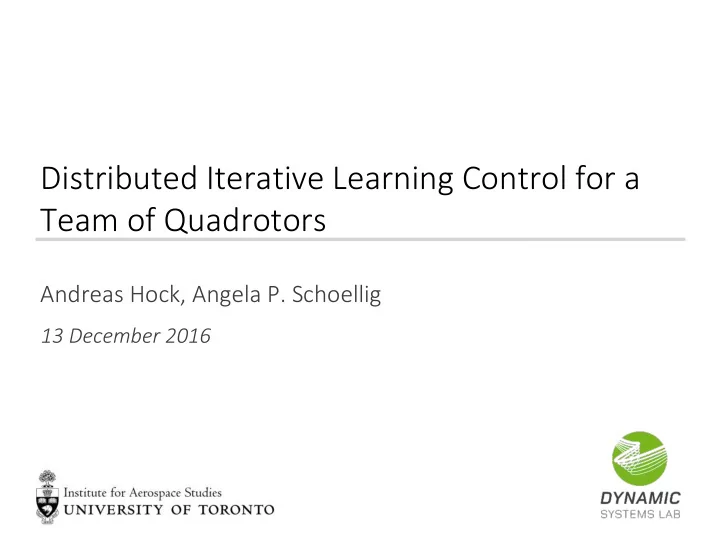

Distributed Iterative Learning Control for a Team of Quadrotors Andreas Hock, Angela P. Schoellig 13 December 2016
Motivation dis isturbances! tim ime delays! Source: www.itsinternational.com model Source: www.kuka.com mis ismatches! Learnin Le ing can make mult lti-robot coordin inatio ion more accurate or faster, , and en enable le it it to adapt to ch changin ing tasks or en envir ironment! Andreas Hock 2
Dis istributed IL ILC fo for r a Team of f Quadrotors • Dis istr tributed Control: No central control unit • Autonomous agents • Communication only between certain neighbors • Iterative Le Ite Learning Machine Learning technique • Control (IL (ILC): Learning by repetition • Updating the feedforward input based on past measurements • Team of f Quadrotors: Goal: synchronous formation flying • Homogeneous LTI dynamics Andreas Hock 3
Pro roble lem Form rmulation There exist several studies on… ILC for a sin single le agent: • theoretic survey [Bristow, 2006] Rela lated Work rk • quadrotor vehicle [Schoellig, 2012] mult lti-agent ILC: [Ahn, 2009; Meng, 2012; Yang, 2012] previous stability proofs for multi-agent ILC restricted to D-type learning functions => cannot compensate for position offsets pure feedforward control Open Proble lems => cannot compensate for non-repetitive errors no experimental validation so far theoretic ical l develo lopment of advanced IL ILC alg lgori rithms for r mult lti-agent systems (M (MAS) S) & exp xperim imental l im imple lementatio ion Andreas Hock 4
Dis istributed IL ILC fo for r MAS – Algorithm Idea of Id f ILC ILC : Use se er error inf informatio ion to to im improve fe feedforward inp input fo for su subsequent ite iteratio ions! New Input = = Old ld Input + + Corr rrecting Actio ion, depending on error in last trial [Arimoto, 1984] [Ahn, 2009] so so far r inp input update for r mult lti-agent ILC IL C only ly based on err rror r deriv rivativ ive restrictive, limited design parameters Goal: l: synchronous reference tr trackin ing position offsets can not be compensated where L can be an arbitrary linear mapping in discrete time! iteration k agent i Andreas Hock 5
Dis istributed IL ILC fo for r MAS – Proof of Stability Graph Theoretic ical Definitions Li Lifted System Representation [Bri [Bristow, 2006] ] [Y [Yang, 2012] ian L G - Con oncept of of graph Lap Laplacia - ILC stabili IL ility an anal alysis in in dis iscrete tim time => B - Reference as as vir irtu tual l le lead ader nod ode => - time sam tim sample les => => fu full ll tr trajectory ry vectors - Single agents’ states => full MAS state Graph Information System Dynamics , Learning Function , with eigenvalues w/ diagonal entries Theorem 1: 1: The multi-agent ILC is as asymptotic icall lly stable le if and only if . For causal learning, this holds iff . crucial design parameter Andreas Hock 6
Dis istributed IL ILC fo for r MAS – Combination with Consensus Feedback Control Pure IL ILC ILC IL C with ith Feedback Theorem 2: 2: A time domain feedback term with linear mapping C C , does not affect stability of the proposed ILC system! NE NEW! Feedback Con ontrol Feedback Con ontrol IL ILC + + Con onsensus s COMPARISON COMPARISON IL ILC IL ILC (Co (Consensus) (Co (Consensus) Feedback learn from tr learn from tr trac trac ackin ackin ing ing erro errors erro errors rs compensate for non compensate for non non- non- rep repetitiv repetitiv rep ive erro ive erro errors errors incorporate rep incorporate rep repetitiv repetitiv ive ive di disturb disturb di rbances rbances Andreas Hock 7
Experimental Result lts Link to Video Andreas Hock 8
Experimental Result lts - Trajectories in x over time fee eedback reaction dela layed an and attenuated x d ILC compensates dela IL lays an and corrects err rrors v 1 v 2 alm lmost perfect tr trackin ing can an be ach achieved Andreas Hock 9
Experimental Result lts - Error Convergence Comparison lower formati tion err error in in the the fir first it iter erati tions s can an accountin ing for non on-repetitive help lp avoid id col ollis lisions dis isturbances im improves performance aft fter le lear arnin ing Andreas Hock 10
Conclu lusion Generali lized stabil ilit ity proof demonstrated that the multi-agent ILC algorithm converges if l 0 is chosen properly => many tuning options for input-update rule We proved that including a consensus feedback controll ller r does not affect stability but improves performance as it compensates for non-repeating disturbances Multi-agent ILC was successfully implemented on a real l exp xperim iment for the first time Andreas Hock 11
Experimental Result lts – Experiment with four quadrotors Link to Video Andreas Hock 12
Conclu lusion Generali lized stabil ilit ity proof demonstrated that the multi-agent ILC algorithm converges if l 0 is chosen properly => many tuning options for input-update rule We proved that including a consensus feedback controll ller r does not affect stability but improves performance as it compensates for non-repeating disturbances Multi-agent ILC was successfully implemented on a real l exp xperim iment for the first time Thank you! Andreas Hock andreas.hock@robotics.utias.utoronto.ca www.DynSysLab.org Andreas Hock 13
Recommend
More recommend